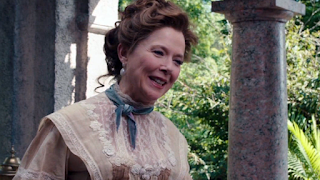Film Review: The Seagull showcases a transcendent Annette Bening
The Seagull
Play by Anton Chekhov
Directed by Michael Mayer
Starring Annette Bening
Director Michael Mayer is known for his Broadway adaptations
of Spring Awakening (2006) and American Idiot (2010), and his Colin
Farrell film At Home at the End of the
World (2004). After these hyperkinetic efforts, The Seagull (written in 1895) would seem an odd choice. Chekhov’s
characters, stuck in their bourgeois vanity and triviality, tend to implode
rather than explode. Mayer’s version toys around with the play a bit, avoiding
the critique of just filming a classic play. Most notably, he plays the start
of Act 4 twice, first at the very beginning of the film, thus presenting the
rest of the play as a flashback leading up to the climactic events. This was
OK, but the exact repeat, disorienting at first, went on a little long,
diluting some energy.
The film is mostly notable for shining light on the
wonderful Annette Bening, whose turn as the aging actress Irina Arkadina was
dominant and extraordinary.
Irina faces the challenges of aging with vanity, domination, and disregard for others’ feelings, most notably those of her son Konstantin, a typically Russian tortured young writer, insecure and envious of his mother’s success. Bening, who I knew from American Beauty (the memorably unhappy housewife) and Being Julia, brings out every insecure nuance of the aging prima donna. It is never clear when she is acting out her love for her family, or whether her feelings are genuine, or whether she has any feelings at all. The play itself is a tragic catalogue of the problems of different life stages. Young Konstantin is tortured by love and uncertain prospects (British actor Billy Howle is just a little too good looking to be physically convincing here, but acts well).
Irina is facing the decline of her physical beauty and the onset of old age, while her brother Sorin (the terrific Brian Dennehy) is already there and acts as elder sage to all the chaos. Chekhov writes in several autobiographical versions of himself; besides the young Konstantin, ranting against conservative theater, there is also Irina’s lover Boris (an excellently sly Corey Stoll), a famous middle-aged playwright who seems a little cynical and in love with his own craft and fame. He has his midlife crisis here, cruelly jilting Irina, (and provoking all her insecurities) by falling in love with young Nina (Saoirse Ronan). Ms. Ronan, known for her transparent and naturalistic acting in Atonement (2006) and Lady Bird (2017), seems miscast or out of her young depth here.
Nina is a really tough role, requiring the actress to be a naïve young girl in love in Acts 1-3, then return as a jaded, failed actress and spurned mistress two years later, in Act 4. She is ardently pursued by young Konstantin, but falls for the middle aged Boris instead (Boris first swoons over her in middle aged horniness, then dumps her after she moves in with him in Moscow). Ms. Ronan never makes all this very convincing. Other critics comment that this role is a traditional killer, defeating most actresses. So Ms. Ronan is in good company, but it is disappointing nonetheless, since she is given publicity costar status with the incomparably superior Ms. Bening.
Irina faces the challenges of aging with vanity, domination, and disregard for others’ feelings, most notably those of her son Konstantin, a typically Russian tortured young writer, insecure and envious of his mother’s success. Bening, who I knew from American Beauty (the memorably unhappy housewife) and Being Julia, brings out every insecure nuance of the aging prima donna. It is never clear when she is acting out her love for her family, or whether her feelings are genuine, or whether she has any feelings at all. The play itself is a tragic catalogue of the problems of different life stages. Young Konstantin is tortured by love and uncertain prospects (British actor Billy Howle is just a little too good looking to be physically convincing here, but acts well).
Irina is facing the decline of her physical beauty and the onset of old age, while her brother Sorin (the terrific Brian Dennehy) is already there and acts as elder sage to all the chaos. Chekhov writes in several autobiographical versions of himself; besides the young Konstantin, ranting against conservative theater, there is also Irina’s lover Boris (an excellently sly Corey Stoll), a famous middle-aged playwright who seems a little cynical and in love with his own craft and fame. He has his midlife crisis here, cruelly jilting Irina, (and provoking all her insecurities) by falling in love with young Nina (Saoirse Ronan). Ms. Ronan, known for her transparent and naturalistic acting in Atonement (2006) and Lady Bird (2017), seems miscast or out of her young depth here.
Nina is a really tough role, requiring the actress to be a naïve young girl in love in Acts 1-3, then return as a jaded, failed actress and spurned mistress two years later, in Act 4. She is ardently pursued by young Konstantin, but falls for the middle aged Boris instead (Boris first swoons over her in middle aged horniness, then dumps her after she moves in with him in Moscow). Ms. Ronan never makes all this very convincing. Other critics comment that this role is a traditional killer, defeating most actresses. So Ms. Ronan is in good company, but it is disappointing nonetheless, since she is given publicity costar status with the incomparably superior Ms. Bening.



Comments
Post a Comment